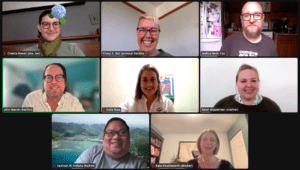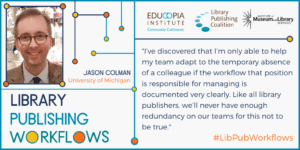May 12, 2022
By Nancy Adams
This post is from the AUPresses Library Relations Committee (Ana Maria Jimenez-Moreno, Jason Fikes, Tracy Kellmer, Stephen Hull, Joell Smith-Borne, Saleem Dhamee, and Annie Johnson). The Library Relations Committee’s core commitment is to make contact with library professionals, discussions, and organizations to deepen our understanding of how together librarians and publishers can create a healthy scholarly ecosystem. This post is being concurrently published on the Scholarly Kitchen blog.
By Annie Johnson and Ana Maria Jimenez-Moreno
In order to gain greater insight into the state of library-publisher relations today, we asked Executive Director of AUPresses, Peter Berkery, and Executive Director of the Association of Research Libraries, Mary Lee Kennedy, to share their thoughts about how relations between the two communities have changed. Their answers ultimately reveal more similarities than differences. They note current sites of collaborations (particularly around open access) and common areas of tension (around financial sustainability). While there has been a refiguring of what publishing means, both groups have a heightened dedication to a just and equitable scholarly environment. We hope these interviews can continue the dialogue that librarians and publishers are having across and within our communities.
Mary Lee Kennedy, ARL
What do library-publisher relations mean to you?
ARL and AUPresses have worked together for years on both TOME (Toward an Open Access Monograph Ecosystem), and P+L, and the community of libraries and university presses that share a reporting relationship. This has given ARL and its membership a close relationship with the university press community and has led to a focus within our Scholars and Scholarship portfolio on university-based publishing. “Publisher” is a broad category encompassing many shapes, financial structures, and interests, so we’ll make some very broad observations about the environment as well as our own work.
Our interest in university presses, scholar-led presses, and library publishing is deliberate — reflecting what we see as a set of strategic opportunities for universities to invest in infrastructure for scholarly dissemination. This is particularly true for the social sciences and humanities, which still depend on long-form publishing for disciplinary and career advancement. It is also true for new and emerging forms of digital scholarship, including digital humanities, preprint services, and new forms of information such as code, methods, and research data publishing.
ARL views the research environment as an ecosystem, in which there are critical roles for scholars, publishers, and libraries. Our mission is to advance both enduring and barrier-free access to information within that ecosystem, and we seek to advance a shared commitment to financial sustainability, research integrity, equity, accessibility and diversity in publishing for the benefit of current and future generations of scholars. In practice, this has meant a commitment to open scholarship and a balanced copyright regime.
(more…)




